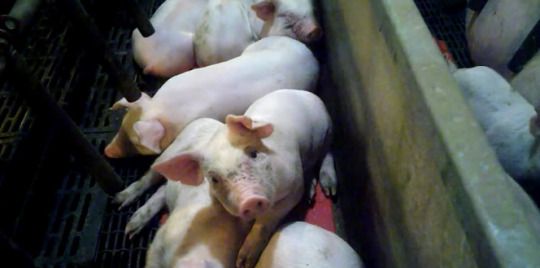#kenny torrella
Explore tagged Tumblr posts
Text
Fires on large-scale animal farms, or factory farms, are surprisingly common. Over the last decade, at least 6.5 million farmed animals, mostly chickens, perished in barn fires in the US, according to Washington, DC-based nonprofit Animal Welfare Institute (AWI). The fires are part of a broader pattern of mass casualty events on factory farms, where 99 percent of America's meat, dairy, and eggs are produced. Some are the result of human or mechanical error, but many stem from natural disasters, such as hurricanes, blizzards, and extreme temperatures, like last summer's scorching heat wave in Kansas that killed thousands of cows who were subsequently dumped in a landfill. Disease outbreaks, too, result in mass death or culling on farms.
- Kenny Torrella, Marina Bolotnikova, and Julieta Cardenas, "A fire killed 18,000 cows in Texas. It's a horrifyingly normal disaster."
Torrella, Kenny, Marina Bolotnikova, and Julieta Cardenas. "A fire killed 18,000 cows in Texas. It's a horrifyingly normal disaster." Vox, April 14, 2023. https://www.vox.com/future-perfect/23683141/texas-farm-fire-explosion-dimmitt-cows-factory-dairy.
4 notes
·
View notes
Text
When it comes to taking the blame for climate change, the energy sector absorbs most of the heat. But more and more, the public is learning about animal agriculture’s substantial role. The raising of animals for slaughter produces 14.5% of global greenhouse gas emissions, approaching half of the energy sector’s 34%. One species in particular looms large in this picture: Around 10% of all global greenhouse gas emissions are produced by the cattle industry.
As awareness grows around the eco-impact of raising cows for meat, the beef industry has been working hard to maintain public confidence. At the center of its efforts is a push to sell consumers on the idea of “climate friendly” or “low-carbon” beef. Tyson’s new Brazen Beef is advertised as a “climate smart” innovation; while the banner of “regenerative beef” — claimed to actually benefit the land — has been taken up by McDonald’s and Walmart.
But what do these buzzwords actually mean? Can beef ever be “climate friendly”?
Tyson Foods is one of the largest meat processing companies in the world. In recent years, it has found itself under pressure to cut eco-impacts and improve its sustainability efforts. It has responded with the introduction of Brazen Beef, which uses cattle “enrolled in Tyson Foods’ Climate-Smart Beef Program for emission reduction from pasture to production,” according to the product’s website. The baseline and metrics needed to measure this 10% reduction, however, is far from clear. “There’s no way that the math even works out,” says Jan Dutkiewicz, a political economist who studies the agriculture industry.
...
In an investigation for Vox, Kenny Torrella reached a similar conclusion. “Tyson’s climate-friendly beef website is full of earnest marketing phrases like this one: ‘If we’re showing up for the climate, then we’ve got to show our work.’ Yet that ‘work’ is nowhere to be found,” he noted.
Tyson told the Progressive Grocer that the company is “trying to be upbeat and different” with a campaign that speaks definitively to younger millennial and Gen Z consumers, the market sector most concerned with the impacts of climate change. The Brazen Beef website is packed with imagery of young adults being active, social and happy.
Launching products like Brazen Beef, says Dutkiewicz, is largely about landing some good press — without much fear of being called to account. “The average food consumer doesn’t spend time studying food,” he says.
...
Land use is also already a major concern when it comes to beef production, making the scalability of regenerative agriculture difficult to conceive. Cattle farming occupies 41% of all land in the U.S., even though 99% of livestock are raised on factory farms. Over 40 million cattle and calves are slaughtered for food annually in the U.S. Transitioning that number of cows to eating grass, says Carter, would require 270% more land. Making regenerative beef viable as a climate-friendly solution would also require significant reduction in overall beef consumption. Decreased consumption, however, rarely appears in the discourse around regenerative agriculture.
...
Re-wilding is the practice of restoring natural habitats ravaged by animal farming by reintroducing native flora and fauna, including native ruminants such as bison. “Cattle can be considered an invasive species,” says senior food campaigner for the Center for Biological Diversity, Jennifer Molidor. Where regenerative ranchers attempt to minimize impacts with rotational patterns and smaller grazing herds, “they fall far short of promoting biodiversity compared to native animals, and more often than not have severe impacts on soil health, water quality and make a monumental contribution to accelerating climate change.”Improving ecosystem integrity is an important part of re-wilding, Molidor explains. It’s also one, she says, “many food producers overlook or misunderstand when attempting to farm in better harmony with the land.” Re-wilding “can heal soil that has been harmed by agricultural degradation and pollution and restore native habitat and improve wildlife connectivity.” But that process is fundamentally incompatible with the cattle industry in its current size and form. Concludes Molidor, “The more cattle we produce, the more the land suffers.”
#enviromentalism#ecology#livestock industry#Cattle#rewilding#greenhouse gas emissions#Regenerative beef
3 notes
·
View notes
Text
Объяснение катастрофы органического земледелия в Шри-Ланке
Переход к более совершенным методам ведения сельского хозяйства возможен, но резкий переход Шри-Ланки на органику преподносит горький урок о том, как не надо мениать продовольственные системы. Рабочие вручную собирают чайные листья в Рамбоде, Шри-Ланка. Буддхика Вирасингхе/Bloomberg via Getty Images Кенни Торрелла (Kenny Torrella) — штатный автор рубрики Vox Future Perfect, специализирующейся…

View On WordPress
0 notes
Quote
I ordered coffee that drank & refilled itself & watched my father sip a Coke through a straw while we ate eggs slowly, without speaking. If I could tell you more, I would, but there was still nothing but the ringing clink of fork on plate & from the kitchen, a chatter above the hissing.
excerpt from Blood On Blood by Devin Kelly, reviewed by Kenny Torrella.
18 notes
·
View notes
Text
The United States Department of Agriculture (USDA) has given two companies approval to sell chicken grown from cells in a lab.Lab-grown, or cell-cultivated, meat is made by feeding a mix of nutrients to animal cells in stainless steel tanks, writes Vox’s Kenny Torrella. Companies hope the product can be an alternative to meat produced by killing animals, which has a large carbon footprint.
1 note
·
View note
Link
I’ve been hesitant to post links to articles about animal cruelty in industrial farms. The photos are always stomach-churning, anger-inducing, heart-breaking and graphic. The stories are equally graphic and disgusting. So many of us don’t want to see or read these photos of stories, including me, particularly if we’re meat eaters, as if isolation and insulation makes us less complicit in the abuse. But once in a while I’ll bust through my hesitancy, and post something, particularly if at the back end there’s success in shutting down a farm or the perpetrators of the abuse are arrested and processed through the criminal justice system.
Warning: The video embedded in the article is graphic. I forced myself to watch it because if I’m posting a link to it, I want to know what I’m doing. It’s unpleasant to watch.

Screenshot of a video by a Mercy for Animals (MFA) investigator at Tosh Farms, a JBS pork supplier based in Franklin, Kentucky. Mercy for Animals.
Excerpt:
In September of last year, two executives of JBS, the world's largest meat producer, based in Brazil, were arrested and charged with insider trading. In May 2017, the billionaire siblings—Wesley Batista, JBS's CEO, and his younger brother Joesley, the firm's former chairman—admitted to bribing more than 1,800 politicians and government officials, including meat inspectors, in an effort to avoid food safety checks.
Now, new undercover video shot by a Mercy for Animals (MFA) investigator at Tosh Farms, a JBS pork supplier based in Franklin, Kentucky, exposes what the animal rights group calls the "malicious and systemic abuse of mother pigs and piglets."
Following the July 17 release of the video, which was taken between December 2017 and March 2018, JBS said it suspended shipments from that supplier site. "The images presented in the video fall completely outside the company's standards," JBS said in a statement, but did not name the supplier involved.
But for MFA, suspending shipments from that single supplier isn't nearly enough. "JBS's decision to suspend Tosh Farms as a supplier is too little, too late," Kenny Torrella, director of communications with MFA, told Truthout. "It amounts to nothing more than meaningless PR spin."
The group, headquartered in Los Angeles, is now calling on JBS to end factory farm cruelty across its global pork supply chains, including the elimination of painful mutilations. In addition, MFA is calling on JBS to prohibit its suppliers from housing sows in tiny gestation crates for nearly their entire lives. These metal cages, the standard of which measures just 6.6 feet x 2 feet—so small that they can't even turn around or lie down comfortably—are where pregnant sows live in factory farms around the globe for nearly their entire lives. In the United States as of 2016, there were 5.36 million breeding sows, most of them kept in gestation crates.
2 notes
·
View notes
Text
Undercover Video Shows Abuse and Torture of Pigs at Factory Farm - HEALTH/SCIENCE/TECH
New Post has been published on https://citizentruth.org/jbs-pig-abuse-factory-farms/
Undercover Video Shows Abuse and Torture of Pigs at Factory Farm

An undercover investigator for Mercy for Animals (MFA) has captured the systemic abuse and torture of pigs on video at the world’s largest meat producer. The MFA investigator secretly filmed the farm animals being cruelly tortured and killed at Tosh Farms in Franklin, Kentucky. Tosh Farms is a major pork supplier to JBS, which is based out of Brazil.
Tyler, the MFA investigator named in EcoWatch’s report, said the pigs looked up to him as if pleading for their lives and that he would never forget the look on their face. He said they “all shared the same look of helplessness and fear” in the face of horrors unleashed on them.
JBS Torture
Tyler documented his Tosh Farms experiences at jbstorture.com, a new website opened for the purpose of exposing JBS’ crimes.
“One mother pig stumbled down a corridor with her uterus hanging outside her body. She wouldn’t live much longer,” he said on the website.
He said he saw farmhands kick pigs in the face and workers rip out the testicles of piglets in brazen cruelty. He witnessed workers smashing the heads of piglets on the concrete to kill them.
“A worker grabbed a piglet, just hours old, by the feet and swung him high and then slammed his head down against the hard concrete,” said Tyler. “Any life left quickly vanished.”
According to the investigation, pigs are subjected to horrendous treatment from the day they are born in crates to the day they are killed at Tosh Farms.
“If JBS executives abused even one dog or cat the way their suppliers abuse millions of pigs, they would be jailed for cruelty to animals,” wrote MFA president Matt Rice. “As the largest meat company in the world, JBS has the power and responsibility to end this torture.”
On viewing the offensive video, JBS announced the suspension of pork shipments from Tosh Farms without. But Kenny Torrella, director of communications at MFA contended that the JBS suspension of shipment from Tosh Farms is not enough, saying that it “amounts to nothing more than meaningless PR spin.”
Pigs and Other Farm Animals Are Gifted With Natural Intelligence, Emotions and Personalities
MFA is calling for JBS to put an end to housing piglets and adult pigs in gestation crates for their entire lives. Raising sows in gestation crates is deemed cruel torture to pigs since they are not able to move around or engage in natural animal behaviors for normal development.
“These curious animals lose their minds from frustration and stress,” writes Lucas Alvarenga, vice president of MFA in Brazil. “They often also suffer painful pressure sores from rubbing against the bars of their crates and crippling joint problems as their muscles waste away from lack of use.”
Animal rights advocates argue that pigs and other farm animals raised for meat are intelligent creatures with matured emotions and individual personalities.
“To help move society to a more ethical food system, we as consumers must think less about ‘what’ is on our plate and more about ‘who’ is on our plate,” said Marc Bekoff, professor emeritus of ecology and evolutionary biology at the University of Colorado, Boulder.
You can watch the video here.
#animal rights#ethical farming#ethical food#farm animals#gestation crates#JBS#Mercy for Animals#pigs and piglets#Tosh Farms
0 notes
Text
Animal News You Can Use: Grassroots activism sees wins

Big news: The Maryland legislature just passed historic fish protection legislation: a two-year moratorium on barbaric and inhumane cownose ray killing contests that have made headlines for their depravity.
This major advance was made possible by a well-coordinated grassroots campaign in the state. Ever wonder what it takes to run such a successful effort? HSUS’s Kenny Torrella offers valuable insights in Nonprofit Quarterly about one critical component of how Massachusetts’ recent Question 3 ballot measure was won.
And don’t believe that such campaigns for animals can only be successful in blue states like Massachusetts and Maryland. In Montana, Missoula banned animal circuses and the local paper this week editorialized in strong terms about the importance of the ban and its positive effect on animals.
Finally, this weekend American beef is on both the menu and the agenda while President Trump and the president of China meet at Mar-a-Lago. But the Chinese government’s encouraging its citizens to eat less meat, something we ought to be doing here, too. I offer comments on the issue to Fox News toward the end of its reporting.
Paul Shapiro Vice President of Policy Engagement The Humane Society of the United States Follow at http://twitter.com/PaulHShapiro
P.S. Video of the week: This may make you appreciate your mom even more.
0 notes
Text
2017: The Year of the Chicken
0 notes